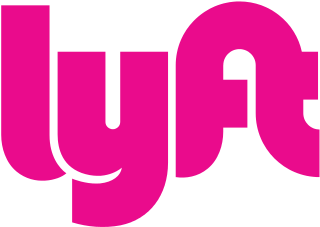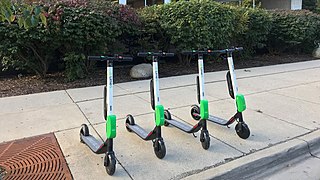
Uber Technologies, Inc., commonly referred to as Uber, is an American multinational transportation company that provides ride-hailing services, courier services, food delivery, and freight transport. It is headquartered in San Francisco, California, and operates in approximately 70 countries and 10,500 cities worldwide. It is the largest ridesharing company worldwide with over 150 million monthly active users and 6 million active drivers and couriers. It facilitates an average of 28 million trips per day and has facilitated 47 billion trips since its inception in 2010. In 2023, the company had a take rate of 28.7% for mobility services and 18.3% for food delivery.

Boda bodas are bicycles and motorcycle taxis commonly found in East Africa. While motorcycle taxis like boda bodas are present throughout Africa and beyond, the term boda boda is specific to East Africa. In Kenya, they are more frequently called piki pikis or Boda. Their ubiquitous presence in East African cities is the result of a number of factors including an increasing demand for public transit, the ability to purchase motorcycles on credit, and an influx of cheap imports from Indian manufacturers like Bajaj and high level of unemployment among the youth. In the countries where they are present, boda bodas can provide transportation options to riders and job opportunities to drivers while at the same time resulting in an increase in road hazards and collisions and unnecessary injuries and deaths.

Lyft, Inc. is an American company offering mobility as a service, ride-hailing, vehicles for hire, motorized scooters, a bicycle-sharing system, rental cars, and food delivery in the United States and select cities in Canada. Lyft sets fares, which vary using a dynamic pricing model based on local supply and demand at the time of the booking and are quoted to the customer in advance, and receives a commission from each booking. Lyft is the second-largest ridesharing company in the United States after Uber.

Shared transport or shared mobility is a transportation system where travelers share a vehicle either simultaneously as a group or over time as personal rental, and in the process share the cost of the journey, thus purportedly creating a hybrid between private vehicle use and mass or public transport. It is a transportation strategy that allows users to access transportation services on an as-needed basis. Shared mobility is an umbrella term that encompasses a variety of transportation modes including carsharing, Bicycle-sharing systems, ridesharing companies, carpools, and microtransit.

A ridesharing company, ride-hailing service, is a company that, via websites and mobile apps, matches passengers with drivers of vehicles for hire that, unlike taxis, cannot legally be hailed from the street.

Ola Cabs is an Indian transportation company that provides ridesharing services and operates other business verticals such as financial services and cloud kitchens. It is headquartered in Bangalore, Karnataka and operates in 250+ Indian cities.
The legality of ridesharing companies by jurisdiction varies; in some areas they are considered to be illegal taxi operations, while in other areas, they are subject to regulations that can include requirements for driver background checks, fares, caps on the number of drivers in an area, insurance, licensing, and minimum wage.
asterRIDE is a referral company that operates and markets transportation services on behalf of limousine and taxi operators across the cities where they operate. AsterRIDE markets their web platform and mobile app asterRIDE, which connects passengers with taxi drivers. As of June, 2015, asterRIDE was available in ten U.S. cities and growing: Chicago, Everett, Fort Lauderdale, Los Angeles, Miami, Naples, Orlando, Phoenix, San Diego, San Francisco, Seattle, and West Palm Beach. According to a release on their website, Las Vegas, New York City, Houston, and Philadelphia were to be added.

Bolt is an Estonian mobility company that offers ride-hailing, micromobility rental, food and grocery delivery, and carsharing services. The company is headquartered in Tallinn and operates in over 500 cities in more than 45 countries in Europe, Africa, Western Asia and Latin America. The company has more than 150 million customers and more than 3 million driver and courier partners. The company has plans for an initial public offering in 2025.

Didi Chuxing Technology Company is a Chinese vehicle for hire company headquartered in Beijing with over 550 million users and tens of millions of drivers. The company provides app-based transportation services, including taxi hailing, private car hailing, social ride-sharing, and bike sharing; on-demand delivery services; and automobile services, including sales, leasing, financing, maintenance, fleet operation, electric vehicle charging, and co-development of vehicles with automakers. The company is a subsidiary of Xiaoju Kuaizhi Inc.

Yandex Taxi is an international company operating taxi hailing and food delivery services across Russia, the CIS, Eastern Europe, Africa, and the Middle East. It is owned by Russian tech company Yandex. The company is among the world's leading developers of self-driving technology.
Careem is a Dubai-based super app with operations in over 70 cities, covering 10 countries across the Middle East, Africa, and South Asia regions. The company, which was valued at over US$2 billion in 2018, became a wholly-owned subsidiary of Uber after being acquired for $3.1 billion in January 2020. Careem expanded into the food delivery business with Careem Now in November 2018, which evolved into Careem Food as well as the rapid grocery delivery service Careem Quik in 2020, and launched a digital payment platform, Careem Pay in April 2022. In April 2023, Careem's Super App business was spun out into a new legal entity, which e& acquired a 50.03% stake in, while Uber maintains full ownership of Careem's ride-hailing business. The Super App currently offers 20 digital services in the UAE including ride-hailing, food, grocery, micromobility, DineOut, and a subscription-based service - Careem Plus, amongst others.

ReachNow was a carsharing service operated by BMW Group in Seattle, Portland, and Brooklyn. It launched in 2016 and it shut down its services in Seattle and Portland on July 17, 2019. It used a mobile app for car reservations and operated a fleet of over 1,000 vehicles. It was one of three car-sharing services in the city of Seattle, competing with car2go and Zipcar. ReachNow was similar to another BMW Group service DriveNow, but was focused on North American cities starting with Seattle. Unlike DriveNow which is a joint-venture with Sixt, ReachNow is a fully owned BMW subsidiary, with RideCell rather than Sixt, providing the technology platform.

Via Transportation, Inc. provides software as a service (SaaS) and mobility as a service to operators of public transportation, multimodal transport, paratransit operations in compliance with laws such as the Americans with Disabilities Act of 1990, non-emergency medical transportation, logistics and deliveries, school bus fleets, commercial ridesharing and corporate shuttles, and autonomous vehicles. Its customers include cities, transportation authorities, government entities, school districts, universities, and private organizations worldwide. It was founded in 2012 and is headquartered in New York City.

Neutron Holdings, Inc., doing business under the name Lime, formerly LimeBike, is a transportation company based in San Francisco, California. It runs electric scooters, electric bikes and electric mopeds in various cities around the world. The system offers dockless vehicles that users find and unlock via a smartphone app that knows the location of available vehicles via GPS.
inDrive, is an international ride-hailing service with more than 200 million downloads operating in more that 700 cities in over 45 countries. Headquartered in Mountain View, California, it is the second largest ridesharing and taxi app worldwide by downloads. The company was officially launched in 2013.
Jason Andrews is an American space and technology entrepreneur. He co-founded with his wife Marian Joh, Andrews Space in 1999, founded Spaceflight Inc. in 2010, BlackSky Global LLC in 2013, and integrated all three entities together in 2015 under Spaceflight Industries.
A series of general strikes was coordinated on March 25, 2019 by Lyft and Uber drivers in Los Angeles, San Diego and San Francisco, California, United States led by rideshare advocate group Rideshare Drivers United. The strikes aimed to protest low wages, long hours, working conditions, and lack of benefits. The event was planned following Lyft's initial public offering. A second strike took place on May 8, 2019 in anticipation of Uber's initial public offering. The strike in response to Uber's IPO took place in 25 major cities across the United States, and were also joined by drivers in other locations worldwide where Uber operates.

Proposition 22 was a ballot initiative in California that became law after the November 2020 state election, passing with 59% of the vote and granting app-based transportation and delivery companies an exception to Assembly Bill 5 by classifying their drivers as "independent contractors", rather than "employees". The law exempts employers from providing the full suite of mandated employee benefits while instead giving drivers new protections:
The Drivers Cooperative or Co-Op Ride is an American ridesharing company and mobile app that is a workers cooperative, owned collectively by the drivers. The cooperative launched in May 2020 in New York City, with the first 2,500 drivers issued their ownership certificates in a media event.













